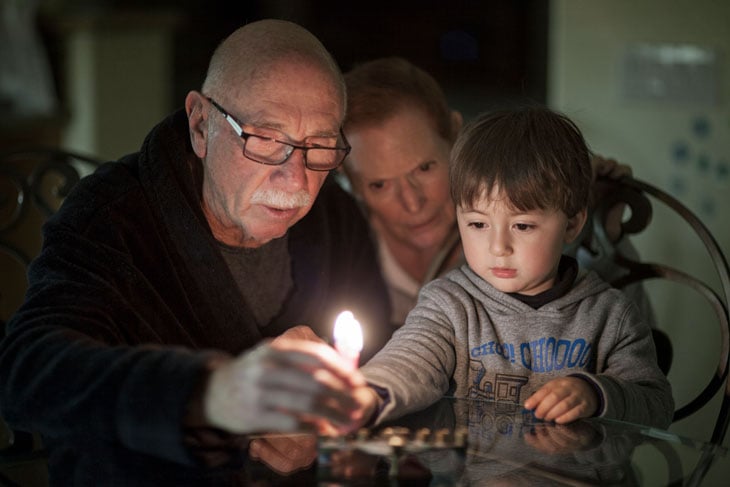
Children and Seniors: How Intergenerational Programs Bridge the Gap
Updated from the original publication on March 13, 2019.
Seniors and children may be at opposite ends of the age spectrum, but they still have plenty in common. Recent studies have found evidence that points to the profound mutual benefits of intergenerational interactions between these two groups. There are many advantages of promoting relationships between children and seniors, and Presbyterian Senior Living is passionate about providing activities to bridge the generation gap.
How Children Benefit from Interacting with Seniors
Spending time with seniors has numerous social and emotional benefits for children. Because families in contemporary society are often separated by geography, many kids lack regular contact with their grandparents. Accordingly, they may lack a basic understanding of the wisdom, companionship, and empathy that older adults have to offer.
Providing children with exposure to seniors helps them understand that aging is not only a natural part of life but that it can also be a positive experience. This gives them a wider perspective on seniors and people with disabilities, while also helping them better accept their own aging.
While all of this sounds wonderful in theory, how does it play out in a real-world context? Engagement and enrichment can take place through a variety of different avenues, including story swapping, letter writing, and skill development.
Older adults have acquired numerous hobbies and talents throughout their lives. In passing these along to children, they not only teach them a new skill but also boost confidence, pride, and independence in the process. Reading and being read to, scrapbooking, playing games, gardening, and preparing meals together are all other ways to keep seniors and children connecting with each other and growing together.  While we often focus on the problem of senior loneliness, the truth is that kids get lonely too. Bringing these two vulnerable generations together has proven to be a simple yet significant way to prevent isolation while fostering feelings of belongingness — a vital part of life at any age.
While we often focus on the problem of senior loneliness, the truth is that kids get lonely too. Bringing these two vulnerable generations together has proven to be a simple yet significant way to prevent isolation while fostering feelings of belongingness — a vital part of life at any age.
How Seniors Benefit from Interacting with Children
Seniors, too, have plenty to gain from interacting with younger children. If they’re separated from far-off family members, they may be experiencing feelings of loneliness, loss, and grief. Spending time with children can help them feel invigorated, engaged, and energized while also provoking fond feelings of time spent raising their own children, as well as happy memories from their own childhoods.
Offering seniors the chance to pass along their knowledge to the next generation also gives them something priceless and yet often missing from the lives of seniors: a sense of purpose.
Whether passing along a particular skill or sharing a piece of wisdom with a child who desperately needs to hear it, seniors find new meaning in these connections. Telling their own stories, meanwhile, gives seniors a unique sense of pride and satisfaction. And who better to listen, ask questions, and truly absorb the full meaning of senior stories than children?
Seniors don’t just benefit from being the teachers. They also have plenty to learn — particularly when it comes to technology. Adapting to the digital world can be overwhelming for seniors, but the prospect of learning from a child makes it slightly less intimidating. Plus, the enthusiasm of kids for the latest gadgets and gizmos is surprisingly contagious.
The upsides of relationships between children and older adults aren’t limited to the social and emotional. Multiple research studies have linked these interactions with a number of physical and cognitive benefits for older adults, including everything from decreased loneliness and delayed mental decline to lower blood pressure and reduced risk of disease and death.
Spending time with kids may also make seniors smile more, according to research from Japan. Even playing video games with a child can make life more exciting for seniors while also improving their cognitive focus, according to researchers from the University of North Carolina.
Understanding the Challenges
The concept of connecting seniors and children is hardly a new one. In fact, intergenerational programs aimed at benefiting both groups have been around for decades. There are, however, some barriers to execution.
Topping the list is proximity. Schools and senior living communities which are located near each other — or even in the same building — have the greatest success when it comes to establishing, cultivating and maintaining relationships.
But proximity alone is not enough. Locations must also be equipped to handle the unique needs of all participants.
Also essential is buy-in from all parties. Intergenerational mentorship initiatives are only successful if everyone, including residents, staff, children and family members, is on board and aligned across everything from purpose to desired outcomes. This goes beyond just offering the programs— together they must create a culture which truly understands and prioritizes the value of the program.
How Presbyterian Senior Living is Getting it Right
We’re delighted to report that multiple Presbyterian Senior Living communities offer thriving programs designed to connect senior residents with children, including Green Ridge Village in Newville, Pennsylvania; Quincy Village in Waynesboro, Pennsylvania; Cathedral Village in Philadelphia, Pennsylvania; and Presbyterian Home at Williamsport in Willliamsport, Pennsylvania.
We don't just offer intergenerational programs, they’re part of our ethos as a Continuing Care Retirement Community (CCRC). The CCRC mentality is built around three fundamental hallmarks of senior living: participation, engagement, and enjoyment. We believe that seniors need all three of these things to lead fulfilling lives and that spending time with children as their mentors, teachers, confidants, and friends is a beautiful part of achieving that goal.
Supporting senior-child relationships is a natural fit for Presbyterian Senior Living. Not only does it go hand-in-hand with our commitment to nurturing meaningful family bonding moments, but it also supports our overall mission of building stronger relationships, creating happier, more engaged individuals, and fostering enhanced quality of life for seniors within our communities.
Visit Presbyterian Senior Living to learn more about our mission to promote wholeness of body, mind, and spirit in seniors within the context of Christian understanding, compassion and a sense of belonging.




